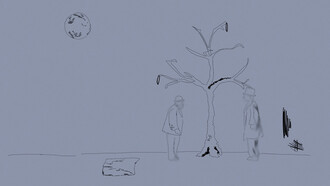"The bombing began, people were lying on the floor, and I froze to the sound of warplanes, accustomed to security where I lived before I came to Gaza. By the time I bowed and everyone was on their feet, and the bombing had stopped," director Ahmad Saleh, whose film “Ayny” won an Oscar in the 2016 Foreign Animated Film category, tells us the story that inspired his film.
Saleh's film about two innocent boys playing with a mine was presented at Ajyal Film Festival 2017 in Qatar. The festival screens films focused on themes such as justice, human rights, and friendship. Jurors aged 8-25 decide the winners.
Directors of the winning films are granted funding toward their next film. Ajyal has screened many films about the injustices faced by the Palestinians. The documentary film about a Palestinian refugee camp, “Little Palestine” was awarded Best Feature Film in 2021.
"My heart was beating hard as I got into the taxi, it suddenly stopped, and I found two children bleeding on my lap. Bypassers were whistling continuously, helping us reach the hospital in the shortest possible time," Saleh continues.
The film depicts how the children continued their lives after the mine left its scars. Hundreds of thousands were unchilded by the Israeli occupation, which brutally injured more than a thousand children, many needing amputations and a number killed during the "Milyoniat Al Awdah" in 2019 alone. The Israeli occupation has killed thousands of children and has around 350 minors held in its prisons today.
“The story would be far too graphic acted by children,” Saleh explains why he chose to make it stop-motion. The process of making a stop-motion film is time-demanding and difficult. Saleh and his team had to move hand-crafted clay puppets into appropriate positions for each scene and shoot each pose separately. After that, they blend the shots with editing software.
Saleh continues telling the story that inspired him, "my thoughts were racing in the hospital, not knowing the fate of the two boys. At that very moment, a hand too short to get my shoulder touched my back. I turned around and a little boy was staring into my eyes.”
“They'll live, don't worry, they're only injured,” he says confidently. “How do you know? Do you know them?" Saleh asked. "The kid in the green shirt is my brother.” "I was supposed to be the one to comfort him," Saleh says. "Omar," he answers, "giving up is not an option for us," he adds.
"Three years after this incident, I asked my sister, with whom I was living at the time, if she remembered this story. She replied that I had never told her. It may have taken me three years to comprehend what had happened.” Saleh concludes.
What Saleh saw sparked a strong desire in him to reveal to the world the atrocities that the Israeli occupation committed. Despite the modest resources, his film outreached the story of Palestinian children to a large audience. It is a film worth watching.















